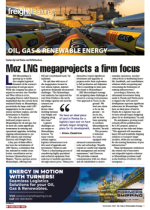LBH Mozambique is gearing up to tackle the complex logistical demands of the country’s burgeoning oil and gas sector. While the company has plans to expand its services into Namibia and West Africa in 2025, managing director Athol Emerton emphasised that the current focus remained firmly on Mozambique, particularly the large-scale LNG megaprojects in the country’s remote northern regions, and the development in Namibia.“Not only do we have a dedicated project team in Mozambique for oil and gas, but we have also made significant investments in training and operational upgrades, including ongoing enhancements to our HSE systems and training,” Emerton told Freight News.A key part of these efforts has been the revitalisation of LBH Xpress, a subsidiary that has resumed its weekly cross-border consolidation service between Johannesburg and Maputo. “Xpress operates across Mozambique, offering both full and consolidated loads,” he explained.He said that with most of the megaprojects located in very remote regions, logistics operations frequently encountered challenges. “The Mozambique road authority has improved the road from Pemba to the north, but bridge capacity and security concerns are significant factors when deciding between road freight and shipping along this route.”Logistics challenges are not unique to Mozambique, however. “In many remote African regions, logistics infrastructure is in dire need of upgrades and investment,” Emerton said. “There is a fascinating process of transferring highly specialised and technical equipment from seaborne to landside operations through remote ports. These ports themselves require significant investment and upgrades as projects evolve from exploration to full production and shipment. This is something we have seen first-hand in Mozambique.”LBH Mozambique’s strategy for navigating these challenges is rooted in a strong, local presence. “Our approach is ‘boots on the ground’. We don’t just claim to be on the ground – we are in situ, and we have been operating in northern Mozambique for decades,” he said.This presence is bolstered by a team equipped with advanced communication tools and technology. “Equally crucial are careful and ongoing risk management and security assessments,” said Emerton. “We prioritise constant communication with our clients and all stakeholders to ensure seamless operations. Another critical focus is facilitating heavy-lift, breakbulk, and consolidation solutions while recognising and overcoming the limitations of existing infrastructure.”According to Emerton, the substantial investments being made in Nacala and Pemba ports to support the LNG sector’s development represent significant milestones for Mozambique. “We have an ideal piece of land in Pemba for a logistics base and we have already begun designing plans for its development,” he said.He anticipates a growing trend towards off-site prefabrication for LNG projects, aimed at reducing on-site risks and delays. “This approach will necessitate heavy-lift and breakbulk shipping solutions to transport larger modules, while also accounting for the existing limitations of port infrastructure.”These developments underscore the critical role of innovative and adaptable logistics solutions as Mozambique positions itself at the forefront of Africa’s LNG resurgence. LV

